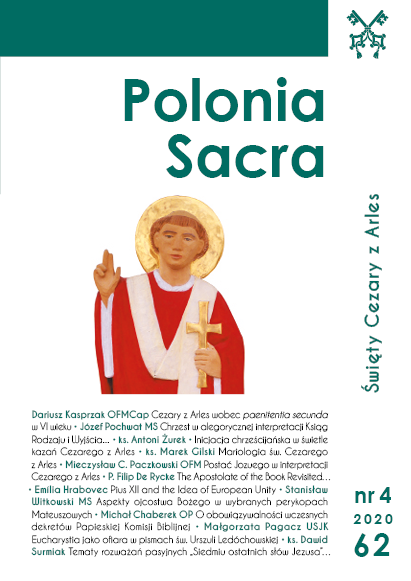Cezary z Arles wobec paenitentia secunda w VI wieku
DOI:
https://doi.org/10.15633/ps.3781Słowa kluczowe:
Cezary z Arles, paenitentia secunda, Galia, VI wiekAbstrakt
Wydaje się, że wezwania Cezarego, biskupa Arles, dotyczące przystępowania wiernych do pokuty kanonicznej, odznaczały się wyczuciem wiernych oraz ich realnych możliwości. Systematyczne zaostrzanie norm pokuty publicznej, podejmowane przez kolejne synody galijskie i jej legalistyczne traktowanie, doprowadziło do kryzysu tej praktyki w Kościele Galii w 1. połowie VI wieku. Cezary, przestrzegając w swym nauczaniu norm oficjalnej pokuty kanonicznej, zaakceptował jednak zwyczaj zdecydowanej większości wiernych, którzy odkładali pokutę publiczną na ostatnie chwile życia. Wzywał ich natomiast do podjęcia wysiłku w wierze i do stałego nawracania się. Pokutowanie przez całe życie stało się w jego nauczaniu synonimem chrześcijańskiej metanoi. W ten sposób wierni stale mogli się przygotowywać do owocnego podjęcia pokuty kanonicznej, podejmowanej zwyczajowo pod koniec życia. Zachęty Cezarego pozostały jednak bezskuteczne, skoro Kolumban i jego bracia, kiedy pojawili się w Galii na początku VII wieku, nie spotkali się z praktyką pokuty kanonicznej w tamtejszym Kościele.
Bibliografia
Acta synodalia ab anno 506 ad annum 553, red. A. Baron, H. Pietras, Kraków 2014 (ŹMT 73).
Césaire d’Arles, Sermons au peuple, introduction, traduction et notes par M.-J. Delage, t. 1, Paris 1971 (SCh 175).
Césaire d’Arles, Sermons au peuple, introduction, traduction et notes par M.-J. Delage, t. 2, Paris 1978 (SCh 243).
Césaire d’Arles, Sermons au peuple, introduction, traduction et notes par M.-J. Delage, t. 3, Paris 1986 (SCh 330).
Ionas Bobiensis, Vitae Sanctorum Columbani, Vedastis, Iohannis, recognivit Bruno Krusch, Hannoverae et Lipsiae 1905 (Monumenta Germaniae Historica. Scriptores Rerum Germanicarum, 37).
Jungmann J.A., Die lateinischen Bussriten in ihrer geschichtlichen Entwicklung, Innsbruck 1932.
Karpp H., La Penitenza. Fonti sull’origine della penitenza nella Chiesa antica, Torino 1975.
Kasprzak D., Kościół IV i V wieku a połowiczne nawrócenia na chrześcijaństwo, w: Problemy duszpasterskie starożytnego Kościoła, red. J. Pałucki i in., Lublin 2009, s. 161–185.
Kołosowski T., Kult chrześcijański w nauczaniu i działalności biskupa Cezarego z Arles, „Seminare” 15 (1999), s. 305–321.
Kołosowski T., Przepowiadanie wiary w środowisku wiejskim w kazaniach św. Cezarego z Arles, w: Ewangelizacja w epoce patrystycznej, red. F. Drączkowski, J. Pałucki, Lublin 1994, s. 39–41.
Kostecki B., Wyznanie grzechów w praktyce pokuty Kościoła na Zachodzie, „Ruch Biblijny i Liturgiczny” 29 (1976) nr 2–3, s. 65–81.
Krzysteczko H., Od publicznej praktyki pokutnej do spowiedzi prywatnej, „Śląskie Studia Historyczno-Teologiczne” 29 (1996), s. 323–239.
Meyer H.B., Neuordnung der kirchlichen Buße. Zum Ordo Paenitentiae 1974, „Heiliger Dienst” 28 (1974), s. 112–116.
Pastuszko M., Pojednanie penitenta z Bogiem i Kościołem (kan. 960), „Prawo Kanoniczne” 42 (1999) nr 1–2, s. 3–56.
Pietras H., „Jeden chrzest na odpuszczenie grzechów” – próba zrozumienia świadectw patrystycznych, „Studia Antiquitatis Christianae” 17 (2004), s. 179–193.
Pochwat J., Dzień Pański w nauczaniu św. Cezarego z Arles w świetle studium jego „Kazań do ludu”, „Vox Patrum” 33/60 (2013), s. 245–262.
Pochwat J., Obraz społeczeństwa Galii pierwszej połowy VI wieku. Studium „Kazań do ludu” św. Cezarego z Arles, w: Księga jubileuszowa ofiarowana Księdzu Profesorowi Franciszkowi Drączkowskiemu z okazji siedemdziesięciolecia urodzin, czterdziestopięciolecia święceń kapłańskich i trzydziestopięciolecia pracy naukowej, red. M. Wysocki, Lublin 2011, s. 315–333.
Poschmann B., Die abendländische Kirchenbuße im frühen Mittelalter, Breslau 1930.
Poschmann B., Paenitentia secunda. Die kirchliche Buße im ältesten Christentum bis Cyprian und Origenes, Bonn 1940.
Ramos-Regidor J., Pojednanie w Kościele pierwotnym, „Concilium” 1–10 (1971), s. 17–26.
Rituale Romanum Pauli V Pontificis Maximi iussu editum, Coloniae Agrippinae 1640.
Sancti Caesarii Arelatensis, Sermones, ed. G. Morin, Turnholt 1953 (Corpus Christianorum. Series Latina, 103–104).
Staniek E., Pytania pod adresem „drugiej pokuty”, „Studia Antiquitatis Christianae” 17 (2004), s. 194–213.
św. Cezary z Arles, Kazania do ludu (1–80), tłum. S. Ryznar (1–55), J. Pochwat (56–80), wstęp J. Pochwat, Kraków 2011 (ŹMT 57).
Vogel C., La discipline pénitentielle en Gaule des origines à la fin du VIIe siècle, Paris 1952.
Vogel C., Le péché et la pénitence. Aperçu sur l’évolution historique de la discipline pénitentielle de l’Eglise latine, w: Pastorale du péché, Tournai 1961, s. 147–235.
Wygralak P., Postawa Cezarego z Arles wobec przemian religijnych i politycznych w Galii VI wieku, „Teologia Patrystyczna” 8 (2011), s. 143–156.
Wygralak P., Praktyki pokutne w nauczaniu św. Cezarego z Arles († 543), „Poznańskie Studia Teologiczne” 8 (1998), s. 99–107.
Zawadzki W., Berharda Poschmanna nauka o pokucie wczesnośredniowiecznej, „Studia Elbląskie” 47 (2010), s. 181–195.
Żurek A., Św. Cezary z Arles, opracowanie i wybór tekstów, Kraków 2002 (Ojcowie Żywi, 17).
Pobrania
Opublikowane
Numer
Dział
Licencja
Autorzy publikujący w czasopiśmie udzielają jego wydawcy zgody o następującej treści:
- Autor zachowuje autorskie prawa majątkowe do utworu, a jednocześnie udziela wydawcy czasopisma zgody na jego pierwszą publikację w wersji drukowanej i wersji online na licencji Creative Commons Uznanie autorstwa 4.0 Międzynarodowe oraz zgody na wykonywanie opracowań, w tym przekładów.
- Autor ma możliwość udzielania zgody niewyłącznej na opublikowanie utworu w wersji, która ukazała się w czasopiśmie (np. zamieszczenia go w repozytorium instytucjonalnym lub opublikowania w książce), wraz z informacją o jego pierwszej publikacji w czasopiśmie.
- Autor może umieścić swój utwór online (np. w repozytorium instytucjonalnym lub na swojej stronie internetowej) jeszcze przed zgłoszeniem utworu do czasopisma.

